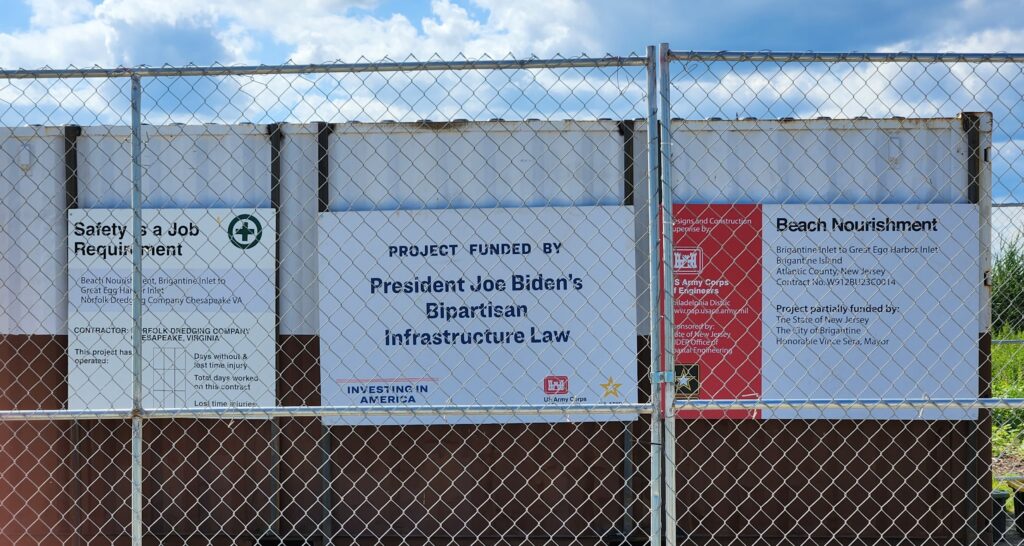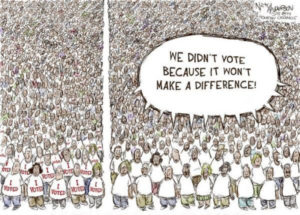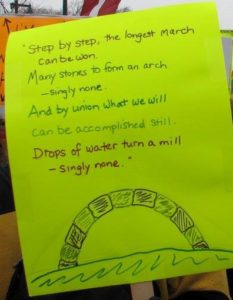Note: TL;DR version of this post (with fewer details and citations) can be found here!

Wildlife area and Atlantic Ocean at Brigantine, NJ, a bit north of the beach nourishment project underway as part of the Infrastructure Investment and Jobs Act
The team of President Joe Biden and Vice President Kamala Harris have accomplished extraordinary measures of progress and change in the country over the past three years.
There is a startling mismatch, however, between the accomplishments of the Biden/Harris administration, which are numerous, and the media presentation of these accomplishments, leading to a severe gap in public awareness and communication.
MAGA Republican politicians and their allies, meanwhile, whose stated plans for the presidency would undermine democracy itself*, take advantage of this by dismissing and ignoring (or taking credit for) the actual accomplishments, along with their usual projection/distraction strategy of accusing Democrats of crimes and scandals they themselves have committed.
The result is a world where voters are overwhelmed and unimpressed, and where people such as Jill Stein, running now as a Green party candidate, can present the two major parties as if they are anything like equivalent.
So, in case you could use some backup references when asked what the President and Vice President have been doing, I am collecting here a growing list of their accomplishments — economic, cultural, diplomatic, health-related, structural — and a sampling of details and sources for each. Several sections for the administration as a whole, and a section in the middle focused on Vice President Harris. The collection is a work in progress, and it is also still under construction.
Note: A number of my quotes and sources are from political historian Heather Cox Richardson, a writer with a particular talent for and dedication to compiling the news of the day in current and historical context.
First year of Biden/Harris administration
– Invoked Defense Production Act for COVID vaccines and distribution (having discovered upon arrival that the Trump administration had no distribution plan)
– Passed the American Rescue Plan (see below), which cut child poverty in half and expanded healthcare access.
– Established Supply Chain Disruptions Task Force
– Rejoined the World Health Organization and the Paris Climate Accords
– Convened the first virtual Summit for Democracy (including 110 countries)
Ooh, you can watch video of the presentations, in multiple languages.
– Largest human airlift in US history (100,000 people) after mess/attacks in withdrawing from Afghanistan
– “[W]orked with North Atlantic Treaty Organization (NATO) allies to counter increasing aggression from Russian president Vladimir Putin, strengthening NATO, while suggesting publicly that further Russian incursions into Ukraine will have serious financial repercussions.”
(HCR 12/30/21 — Note this is before the Russian invasion of Ukraine in February, 2022.)
President Biden’s Executive Orders
Unlike Trump, Biden has used his executive orders to put through things that were popular with the people.
– Executive orders in Biden’s first 100 days as President, including reversals of Trump policies.
– Up-to-date list of executive orders, memos, and proclamations.
Major Legislation
American Rescue Plan — signed March 2021
– March, 2021: White House Fact Sheet (pdf)
– May, 2022: Detailed one-year report, “Advancing Equity through the American Rescue Plan” (pdf, 300 pp.)
“The new law cut child poverty in half by putting $66 billion into 36 million households. It expanded access to the Affordable Care Act, enabling more than 4.6 million Americans who were not previously insured to get healthcare coverage, bringing the total covered to a record 13.6 million.” (HCR 12/30/21)

Signs about the Beach Nourishment Project in Brigantine, NJ
Bipartisan Infrastructure Law / Infrastructure Investment and Jobs Act (BIL or IIJA, Public Law 117-58) — signed November 15, 2021

High tide at Brigantine Beach, July 2023
Some of the 44,000 BIL projects to date:
– Beach Nourishment in Brigantine, NJ (Coastal Storm Risk Management, Hurricane, and Storm Damage Reduction Projects) through the US Army Corps of Engineers; see photos
– Repair of Fern Hollow Bridge in Pittsburgh, PA
My friend Sean Crist, who lives close enough to the bridge to have heard the chaos after its collapse, put together a video chronicling the 11-month progress from collapse to reopening.
– Expansion of Sarasota Bradenton International Airport, which I know about because “House speaker Mike Johnson (R-LA) joined members of the Florida congressional delegation today to view an expansion project at the Sarasota Bradenton International Airport funded by the Bipartisan Infrastructure Law although Johnson voted against it.” (HCR 11/27/23)
Lists and Maps for the Bipartisan Infrastructure Law:

Construction Vehicles in Brigantine, NJ, in July, 2023
– A sampling of BIL-funded
infrastructure projects from the US Department of Transportation (USDOT)
– BIL
State Fact Sheets (also linked within the USDOT sampler), including links for US territories and Tribal lands
–
General map with BIL project examples from all 50 states plus US territories
CHIPS and Science Act — signed August 9, 2022
– White House Fact Sheet
– One-year anniversary article from the Department of Energy
– ALL the BIL and CHiPS projects, with filters by state, by public/private/stories, by type of industry, etc…
Inflation Reduction Act — signed August 16, 2022
– White House statement of the ways the Inflation Reduction Act impacts Americans “by the numbers”
– Price cap on insulin for those on Medicare. (President Biden followed this up with calls for a similar cap for all Americans, and pharmacy companies are following through.)
– Energy efficient appliance rebates (which have been disseminated to the states but are possibly not active yet)
Vice President Kamala Harris
Remarks by Vice President Harris at the Annual Retreat of the Women’s Missionary Society of the 7th Episcopal District of the African Methodist Episcopal Church, Myrtle Beach, SC, 1/6/24
– Harris has met with 150+ world leaders, including diplomatic work in the IndoPacific, Africa, South Asia, and Latin America.
– Diplomacy with Central American leaders and with Mexican president about border issues.
5/27/21: Call to Action for investment in Guatemala, El Salvador, and Honduras (“Northern Triangle”)
July 2021: Released “U.S. Strategy for Addressing the Root Causes of Migration in CentralAmerica” report. (pdf)
2/6/23: Launched Central America Forward to promote economic growth and worker support in countries from which people come to the US.
– Point person for gun safety legislation
4/7/23: Rallied in Tennessee to support ousted legislators who had spoken out against gun violence.
– Point person for Reproductive rights
9/12/22: Met with civil rights and reproductive rights leaders at the White House to discuss coalition building between their organizations to protect reproductive health care and abortion access.
1/22/24: Kicked off “Fight for Reproductive Freedoms” tour in Wisconsin on the 51st anniversary of the Roe v. Wade decision.
– Point person for Maternal health
12/7/21: Led the White House’s First-Ever Maternal Health Day of Action.
4/13/22: Hosted the First-Ever Meeting of Cabinet Officials on Maternal Health, during Black Maternal Health Week.
– Long History of Support for LGBTQ+ issues
6/26/24: Visited the Stonewall Inn to demonstrate support during Pride month.
Also, though not as VP: “When she was the San Francisco district attorney, Ms. Harris spent Valentine’s Day in 2004 officiating same-sex marriages, before the state Supreme Court ordered the city to stop performing the weddings and nullified the unions.”
While looking things up, I found this fascinating article from 2020, making connections with Harvey Milk, through their shared campaign strategist Jim Rivaldo (Harris for DA in 2003, Milk for City Supervisor in 1977).
– Ongoing support for Civil Rights and Racial Justice
– Point person for Protecting the vote
1/11/22: Campaigned in Atlanta for sweeping voting rights legislation: the John Lewis Voting Rights Advancement Act and the Freedom to Vote Act, although the Senate Republicans blocked them by filibuster.
Strong focus on young people
– September-October, 2023: Nationwide “Fight for Our Freedoms” College Tour
Some articles about VP Harris:
HCBU Pulse, March 3, 2023: “Kamala Harris’s Accomplishments As The 49th Vice President Of The United States”
Daily Beast, August 12, 2023: “It’s Time to Give Kamala Harris Her Due”
American Presidency Project at UC Santa Barbara, August 21, 2023: “In Case You Missed It: She’s been Everywhere”
DAME Magazine, October 12, 2023: “The Media Has a Real Thing Against VP Kamala Harris”
Economy
Some numbers
“Today’s job numbers came in higher than expected, with the U.S. adding 253,000 nonfarm jobs in April. Unemployment fell yet again, to 3.4%, matching a rate not seen since 1969. Black unemployment is at an all-time low of 4.7%. For Hispanics it’s 4.4%, and for Asian Americans, 2.8%. The rate for adult women is 3.1%. Average hourly wages rose 0.5%.”
(HCR 5/6/23)
“Data from the Bureau of Economic Analysis released today showed inflation continuing to come down. In November the Personal Consumption Expenditures (PCE) price index was 2.6% over the previous November, down from 2.9% in October. The Federal Reserve aims for 2%. Falling gas prices meant that overall, prices actually dropped in November for the first time since April 2020.”
(HCR 12/22/23)
“At home, minimum wage increased in nearly half of U.S. states; it has been 14 years since the last increase in the federal minimum wage, the longest stretch since 1938 according to the AFL-CIO. NPR correspondent David Gura quoted Goldman Sachs’s chief equity strategist to note, ’”The S&P 500 index returned 26% including dividends in 2023, more than 2x the average annual return of 12% since 1986.'”
(HCR 1/2/24)
Workers’ Rights
– 9/26/23: Supported successful autoworkers’ strike, joining a picket line in Detroit, MI.
– 11/9/23: Visited auto plant in Belvidere, IL, which had reopened as part of the strike settlement.
“Biden had worked hard to get the Belvidere plant reopened, and he joined the UAW picket line—the first president to do such a thing. He told the autoworkers that he ran for the presidency ‘to…bring back good-paying jobs that you can raise a family on, whether or not you went to college, and give working families more breathing room. And the way to do that is to invest in ourselves again, invest in America, invest in American workers. And that’s exactly what we’ve done.’
“In Belvidere, Biden and UAW president Shawn Fain cut a selfie video. In it, Biden says: ‘[Y]ou know, the middle class built this country, but unions built the middle class. And when unions do well, everybody does well. The economy does well.'”
(HCR 11/10/23)
Inflation vs. corporate profits
– “President Biden has launched a campaign to push back on corporate profiteering, including cracking down on the practice of so-called junk fees—unexpected hidden costs for air travel, car rentals, credit cards, cable television, ticket sales, and so on. (The airline industry collected more than $6.7 billion last year in baggage fees, for example.)” (HCR 11/21/23)
Student loans
Couldn’t change the laws, but did enforce existing laws.
More details to come.
Supply Chains (HCR 11/27/23)
– 11/27/23: “…the administration today announced nearly 30 new actions to strengthen the country’s supply chains”
– 2/24/21: Established task force to find vulnerabilities — 250-page report in June 2021
– Implemented recommendations:
“From October 2021 to October 2023, supply chain pressure, which is tracked by the Federal Reserve Bank of New York, fell from near-record highs to a record low. That, in turn, has helped to lower inflation.
Now Biden has established a new White House Council on Supply Chain Resilience to make sure those supply chains stay strong.”
– two weeks ago, Biden signed a supply chain agreement with 13 countries in the Indo-Pacific that he said will enable the countries to identify supply chain bottlenecks “before they become the kind of full-scale disruptions we saw during the pandemic.”
Diplomacy Within our Borders
President Biden has hosted three Tribal Nations Summits at the White House, announcing new Native American Initiatives.
Tribal interests have also been specifically included in multiple other policies.
Foreign Policy
US Border policies
– Investment in Central American Countries to reduce need to flee (See above under Harris)
Diplomacy abroad
Response to Russian invasion of Ukraine on 2/24/22
Responded in military, diplomatic, and financial ways, as implied in prior statements (see above, working with NATO).
More detail to come.
Yemen
“…[N]otably, the administration helped to end the war in Yemen by setting the terms for a truce mediated by the United Nations. That truce has held—so far—for fourteen months. ‘Humanitarian aid and fuel are flowing through Yemen’s ports, the civilian airport in Sanaa has reopened, and the parties are actively in discussions on a roadmap to ultimately bring this war to an end.'”
(HCR 5/6/23, quote from National Security Advisor Jake Sullivan)
Response to Hamas’ attack on Israel on 10/7/23 and Israel’s retaliation on Gaza
While his messaging to the American public has lacked nuance and has been unsatisfactory in a number of ways, Biden and Secretary of State Anthony Blinken have worked pragmatically and consistently to urge restraint, allow for humanitarian aid, and limit the engagement of surrounding nations.
APEC Summit and Relations with China (HCR 11/16/23)
“The summit of the leaders of the Asia-Pacific Economic Cooperation (APEC) economies continued today in San Francisco, California.
Formed in 1989, APEC is made up of the economies of 21 nations around the Pacific Rim: Australia, Brunei, Canada, Indonesia, Japan, South Korea, Malaysia, New Zealand, Philippines, Singapore, Thailand, Taiwan, Hong Kong, China, Mexico, Papua New Guinea, Chile, Peru, Russia, Vietnam, and the United States. Together, these economies make up about 62% of global gross domestic product and almost half of global trade.”
…
“Going into this summit, then, the U.S. had the leverage to get agreements from China to crack down on the precursor chemicals that Chinese producers have been shipping to Latin America to make illegal fentanyl, restore military communications between the two countries now that Li has been replaced, and make promises about addressing climate change. Other large issues of trade and the independence of Taiwan will not be resolved so easily.
Still, it was a high point for President Biden, whose economic policies and careful investment in diplomatic alliances have helped to shift the power dynamic between the U.S. and two countries that were key geopolitical rivals when he took office. Now, both the U.S. and China appear to be making an effort to move forward on better terms. Indeed, Chinese media has shifted its tone about the U.S. and the APEC summit so quickly readers have expressed surprise.
Today, Biden emphasized “the unlimited potential of our partnerships…to realize a future that will benefit people not only in the Asia-Pacific region but the whole world,… [a] future where our prosperity is shared and is inclusive, where workers are empowered and their rights are respected, where our economies are sustainable and resilient.”
Biden and administration officials noted that companies from across the Asia-Pacific world have invested nearly $200 billion in the U.S. since Biden took office, creating tens of thousands of good jobs, while the U.S. has elevated its engagement with the region, holding bilateral talks, creating new initiatives and deepening economic partnerships.
Today, Biden and Commerce Secretary Gina Raimondo announced that the Indo-Pacific Economic Framework, an economic forum established last year as a nonbinding replacement for the Trans-Pacific Partnership former president Trump abruptly pulled out of, had agreed on terms to set up an early warning system for disruptions to supply chains, cooperation on clean energy, and fighting corruption and tax evasion.”
Some Letters from Heather Cox Richardson, cited or referenced herein:
(HCR 12/30/21)
(HCR 5/6/23)
(HCR 11/10/23)
(HCR 11/16/23)
(HCR 11/27/23)
(HCR 12/22/23)
(HCR 1/2/24)
——–
* That is, more than they are already, from blocking voting rights legislation to holding the country hostage by conditioning funding the country and paying its bills upon their whims of extremism.
Here are some of the Republican plans if they win the presidency (some general, some specifically for Trump):
– Project 2025 (Wikipedia, not official project link)
– Climate and Environmental Policy
– Immigration
– Dictatorship
– Revenge
– Criminalization of Queer/Trans people by “declaring any and all LGBTQ content to be pornographic in nature”.




 If you, or someone you know, is wondering “Why should I bother to vote today?” my current answer isn’t about the vast sweeping changes across the nation in the past two years and the fate of our democracy. My current answer is this:
If you, or someone you know, is wondering “Why should I bother to vote today?” my current answer isn’t about the vast sweeping changes across the nation in the past two years and the fate of our democracy. My current answer is this:
